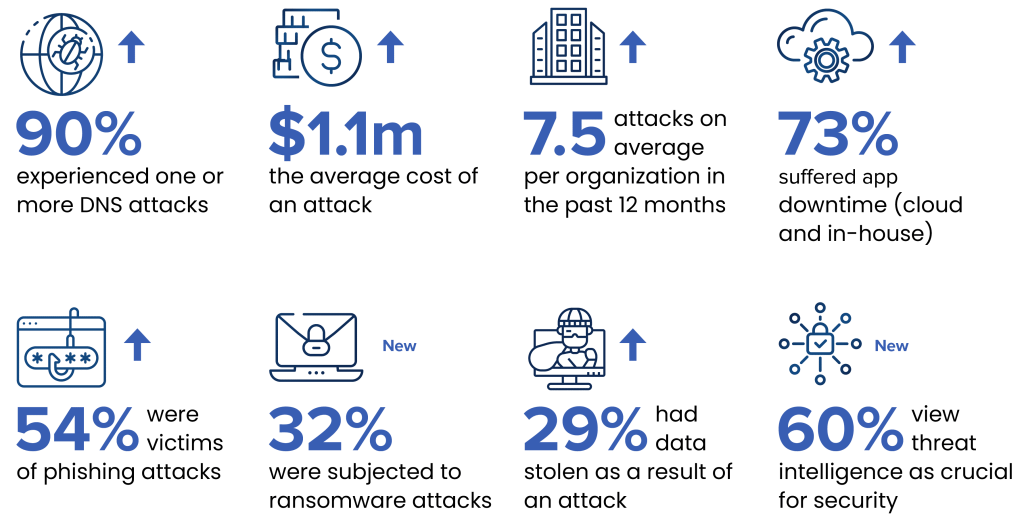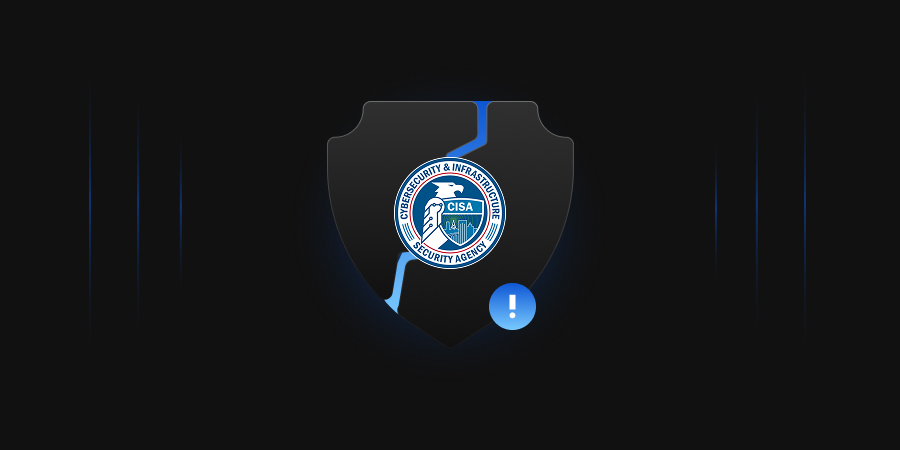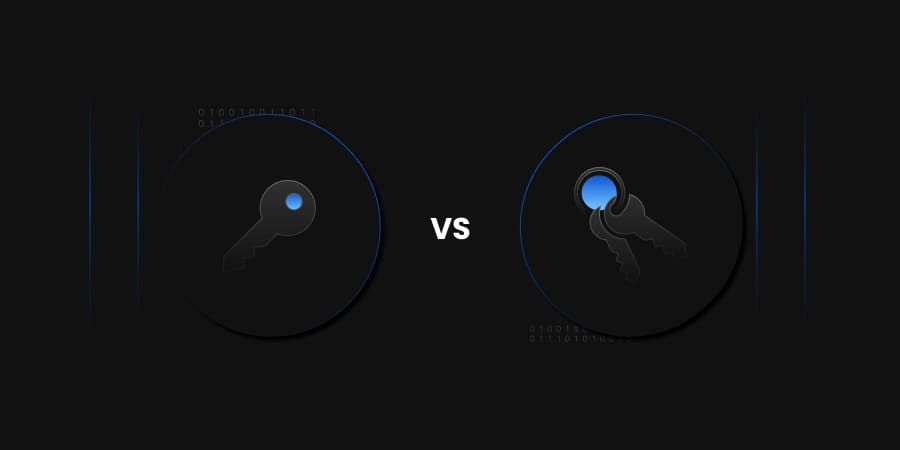Domain Name System (DNS) is often referred to as the phonebook of the internet, as it converts domain names like yoursite.com into their respective IP addresses, allowing users to access the website. The scope of DNS is not limited to the conversion of domain names, but it also provides other functionalities like guiding traffic to the correct endpoint, storing pre-visited domain names temporarily to speed up future queries, facilitating email routing, and ensuring secure communication through features like DNSSEC(DNS Security Extensions).
Due to the central role of DNS, it becomes a good target for attackers to steal data, inject malware, or hijack the website. In the 1980s, cybersecurity was not a major concern for enterprises, but in today’s world, cybersecurity is a top priority for any individual, organization, or business. Similarly, securing DNS is important to prevent attacks like DDoS, DoS, and others. It’s high time for organizations to consider DNS security end-to-end and evolve their security infrastructure.
Role of DNS in Cybersecurity
DNS plays a pivotal role in cybersecurity by serving as a key point of entry for many types of cyberattacks. Attackers often target DNS infrastructure to redirect users to malicious websites, disrupt network traffic, or infiltrate systems. For example, DNS spoofing or cache poisoning can lead to users being unknowingly directed to fraudulent websites, enabling phishing and malware distribution. Additionally, DNS can be used for data exfiltration through DNS tunneling, where attackers encode data into DNS queries to bypass security measures.
To prevent these attacks, organizations must keep an eye on DNS requests, as DNS itself cannot check whether a website contains malware or viruses. According to the 2023 Global DNS Threat Report by IDC, 90% of organizations have experienced one or more DNS attacks, and the average cost of the attack is estimated at around $1.1 million USD. The majority of attacks compromising DNS security are phishing attacks and ransomware attacks, resulting in downtime of applications or stolen data.

This is a matter of concern as DNS attacks and the cost of these attacks are increasing every year. In 2022, the average cost of a DNS attack was $942 thousand USD, which increased to $1.1 million USD in 2023. To prevent these challenges, organizations must implement strong security policies that ensure the security of applications, services, and the environment.
DNS Vulnerabilities
DNS vulnerabilities refer to weaknesses in the DNS infrastructure that attackers can exploit to compromise a network’s integrity, availability, or confidentiality. Common DNS vulnerabilities include:
1. DNS Spoofing (Cache Poisoning)
Attackers manipulate DNS cache records to redirect users to malicious sites by injecting false data into a resolver’s cache. Victims may believe they are visiting a legitimate website, like a bank, while being redirected to a malicious server.
Impact: Credential theft, Malware distribution.
Here are some of the most famous DNS Spoofing incidents:
- Widespread DNS Spoofing Attack against Indian Users, 2023
- Cloudflare Attack, 2019
- DNS Spoofing to Disrupt Middle Eastern Banks, 2018
- Voter Fraud Attack in France, 2015
2. DNS Amplification Attacks
A type of Distributed Denial-of-Service (DDoS) attack where attackers exploit open DNS resolvers to overwhelm a target server with traffic. The amplification effect comes from sending small requests that result in much larger responses directed at the target.
Impact: Network congestion, Downtime.
Here are some of the famous DDoS attacks:
- Novel DDoS Attack, 2023
- Google Attack, 2020
- AWS Attack, 2020
- GitHub Attack, 2018
- CloudFlare DDoS Attack, 2014
3. DNS Tunneling
DNS is used covertly to transfer data or communicate with command-and-control (C2) servers. Attackers encode data in DNS queries and responses to bypass traditional security measures, often exploiting unmonitored DNS traffic.
Impact: Data exfiltration.
Here are some of the most famous DNS tunneling incidents:
- Attack on U.S. Government Networks (APT34), 2021
- Cyberattack on Iranian Industrial Control Systems (Shamoon Malware), 2020
4. Misconfigured DNS Settings
Improperly configured DNS servers can expose sensitive information, enable unauthorized access, or leave an organization vulnerable to attacks.
Impact: Information leakage, Unauthorized DNS changes.
Here are some of the most famous Misconfigured DNS Settings incidents:
- Cloudflare DNS Misconfiguration(Cloudbleed), 2017
- Accenture DNS Misconfiguration, 2020
5. Domain Hijacking
Attackers gain unauthorized control of a domain name by compromising DNS registrar accounts or exploiting vulnerabilities in DNS management systems. This allows them to redirect traffic or impersonate the domain.
Impact: Credential theft, Reputation damage.
Here are some of the most famous Domain Hijacking incidents:
- The Hijacking of Sony’s Domain (sony.com), 2021
- The Hijacking of Tencent’s Domain (qq.com), 2019
- The Attack on Twitter (twitter.com), 2015
6. Dynamic DNS (DDNS) Misuse
DDNS services, which allow frequent IP address updates, can be abused by attackers to host malicious content or facilitate botnet activities.
Impact: Spread of malware and ransomware, exploitation of weak DNS security
Here are some of the most famous DDNS Misuse incidents:
- Attack on ACME via DDNS, 2016
- The “Mirai” Botnet and DDNS Exploitation, 2014
Mitigation Strategies
Mitigating DNS attacks is crucial to ensuring the integrity and security of your network infrastructure, as DNS vulnerabilities can lead to significant disruptions, data breaches, and other malicious activities. These mitigation strategies will help your organization to protect against various types of DNS attacks:
1. Implement DNSSEC for Authenticating DNS Responses
DNSSEC (Domain Name System Security Extensions) is a suite of extensions that add security to the DNS protocol by enabling authentication of DNS responses. By using DNSSEC, enterprises can prevent attackers from tampering with or spoofing DNS data. DNSSEC works by signing DNS records with cryptographic keys, allowing resolvers to verify the integrity and authenticity of the DNS responses they receive.
2. Use Encrypted DNS Protocols Like DNS over HTTPS (DoH) or DNS over TLS (DoT)
Encrypting DNS traffic ensures that sensitive DNS queries cannot be intercepted or manipulated by malicious actors during transmission. DNS over HTTPS (DoH) and DNS over TLS (DoT) are two protocols that encrypt DNS requests between clients and resolvers, preventing attackers from conducting eavesdropping or man-in-the-middle attacks on DNS communications. DoH uses standard HTTPS connections, making it harder for attackers to distinguish DNS traffic from other web traffic, while DoT uses encrypted TLS connections.
3. Monitor DNS Traffic for Anomalies and Signs of Tunnelling
Regular monitoring of DNS traffic is essential to detect abnormal patterns that may indicate malicious activity or exploitation. Suspicious activities such as DNS tunneling, where attackers encode data within DNS queries to exfiltrate sensitive information or establish a covert communication channel, can be identified by examining DNS traffic for unusual request rates, abnormal query types, or unfamiliar domain names.
4. Restrict Public Access to DNS Resolvers
DNS resolvers are crucial components in the DNS infrastructure, translating domain names to IP addresses for users. If these resolvers are exposed to the public, they can be exploited for attacks, such as DNS amplification attacks, where attackers send small queries that result in large responses directed at a victim. To mitigate these threats, organizations should configure their DNS resolvers to limit public access, allowing only trusted IP addresses or networks to query them.
How Encryption Consulting Can Help
Encryption Consulting provides specialized services like Encryption Advisory Services, ensuring cryptographic solutions for DNS encryption are compliant with FIPS 140-2/3 standards, particularly for government or defense sectors (e.g., DoD).
Securing updates to DNS servers or software managing DNS is critical. Our code-signing solution, Codesign Secure, will ensure that these updates are signed using code-signing practices, preventing attackers from injecting malicious code into DNS systems.
Conclusion
As cyber threats continue to evolve, securing DNS has become a fundamental part of an organization’s overall security framework. Given the essential role DNS plays in guiding internet traffic, storing domain names, and ensuring secure communication, cybercriminals can exploit its vulnerabilities for malicious purposes like data leaks, phishing, and malware distribution. The increasing number and cost of DNS attacks highlight the need for organizations to prioritize DNS security through the implementation of measures such as DNSSEC, encrypted DNS protocols (DoH, DoT), traffic monitoring, and restricting public access to resolvers.
By ensuring robust DNS security, organizations can protect their networks, preserve data integrity, and maintain seamless operations, reinforcing their defense against a wide range of cyber threats. As part of a broader cybersecurity framework, secure DNS practices are essential for staying ahead of potential risks.




